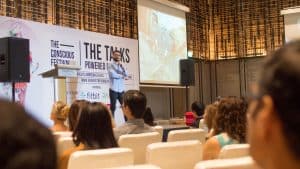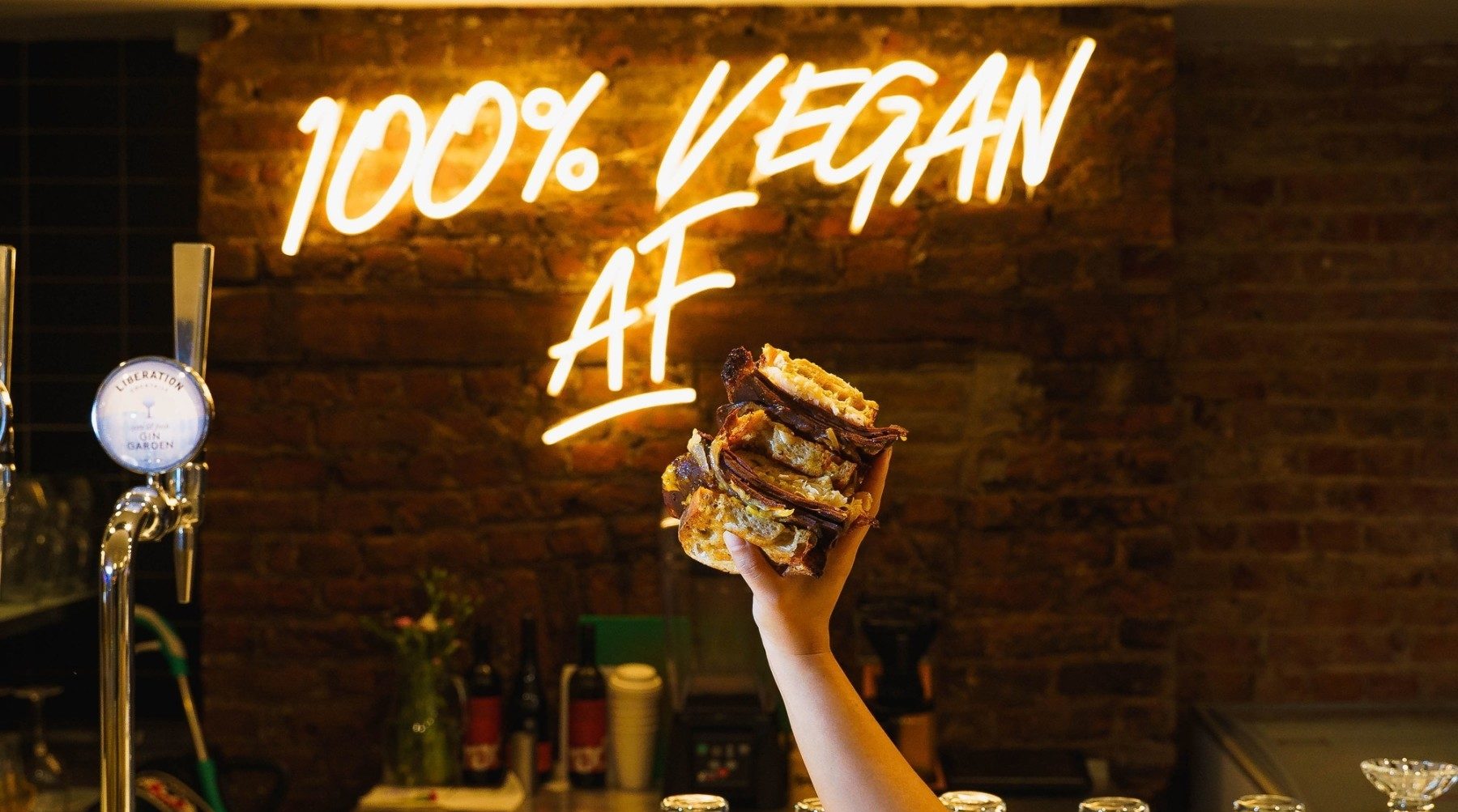Live with no excuses, and travel with no regrets.
You know the drill by now. We have no excuse for single-use, but many of us still feel guilty about our personal environmental impacts when we travel; are we doing more harm than good? There is still so much of the planet that is unexplored; do these places hold the secrets to our survival? In this final summary of everything we learned at the TALKS powered by DBS, we’ll be exploring how to travel while not impacting the world, and being low waste while travelling, festivals and movements bringing change to Asia, and why underwater exploration is so important for the survival of our planet. And in case you’ve missed it, here’s Part One (the LIVE track), Part Two (the WORK track) and Part Three (the CONSUME track).

Not so blue- Little Stories from The Philippines
Ugo Di Mauro (Photojournalist)
If you’ve spent any time at all on our website or our Facebook page, you’d know that we’re massive fans of taking #LittleGreenSteps. Well, Ugo Di Mauro was at the TALKS to prove firsthand that our little steps don’t have to be big, bold or difficult- but they can definitely make a massive difference. He related to us the stories of the people who live in the slums of the Philippines; where the children run around collecting plastic bottles to sell for mere cents in order to buy food to live and where many of the adults have sold their kidneys for the same purpose. He told us of how nature has reclaimed an abandoned recycling center for itself again, and turned what used to be literal mountains of trash into mountains of green. He went to the top of “Smoky Mountain” and saw the “soil” conditions of it for himself, and how the people were trying to grow their own vegetables in this very soil. And Ugo told us about how the downfall of the environment has caused the fall of the country’s national icon: the Philippine Eagle. But despite all these problems, he highlighted how as individuals, the power is with us to control the information we receive and what we do with it.
“There are problems all around, but we can all be part of the solution.”
And how sometimes, creating a massive change in the communities you visit on your travels can be as simple as going to a supermarket and purchasing as many bars of soap as you have the money for.
#LittleGreenSteps:
Respect nature. Do whatever you can with whatever you have, whenever you can (after first directly consulting with the people you are helping about what they really need). And be prepared and willing to listen to the stories of the people who live in the local communities, and ready to make a difference in any small way you can.

Living Planet Edit & Panel
Janissa Ng (WWF) | Kim Stengert (WWF), Andie Ang (Raffles’ Banded Langur Working Group), Zeehan Jaafar (NUS), Samantha Lai (NUS),
“We have a nature deficit; We don’t really know what’s out there or why we need to protect it.” Discussing the results of the 2018 WWF Living Planet Report, Janissa Ng gave it to us straight: The results aren’t looking that great. In the last 44 years alone, the Earth has lost over 60% of its biodiversity. Over-exploitation and habitat loss are driving these changes, and we humans are to blame. So what can we do about it?
The first step is always education. We need to learn what creatures we are dealing with, as well as teach ourselves and our children the correct etiquette to use when we’re out in nature. We have learn to co-exist with the animals who live in natural areas in close proximity to our housing estates, as well as learn how to properly deal with and live with the wild animals who may venture out of the habitats that we have encroached upon. We also need to change the perceptions we have of wildlife, and consider all of them equal; not just the ones that look more cuddly and cute. Instead of saying “Is enough being done?” we should think “What more can I do?” And we shouldn’t just rely on the government to make these changes for us; we need to use our own voices to fight for the voiceless, and to fight to keep the green spaces that are so important to our mental and physical well-being, as well as the well-being of our planet.
#LittleGreenSteps:
Educate yourselves on the animals who may live in the same environments that you do. Value the nature all around you, and use your voice to fight to keep these green spaces and habitats for our local wildlife.

Why Underwater Exploration is Important for our Survival
Adam Broadbent (ZuBlu Diving)
Oceans play an incredibly important role in all of our lives. It creates over 50% of our oxygen, absorbs more Co2 than our atmosphere, has created over 260 million jobs in fisheries and a USD$3 trillion ocean-based economy. Over 50% of international travel is to coastal areas, the reef-based industry is valued at over USD$39 billion, and 1/2 the world lives within 100km of the sea. As you can probably glean for yourself, the sea is pretty darned important to us. Unfortunately, incidents of overfishing have increased significantly across the globe, and the 8 billion tonnes of plastic that’s finding its way into the sea annually is literally killing both fish and the wildlife that eat the fish in the sea. Whether it be birds or whales, we’re finding them with bellies full of plastic trash, washed up dead on the beaches.
So how does travel come into this, and what can we do? Well, travelling has many environmental impacts, such as Carbon Emissions, Water Usage, Energy Usage, Waste, Environmental Stress, Loss of Diversity and Displacement of local communities. Travel is capable of doing both great good and great damage; and it can also affect the way countries treat their citizens, wildlife and environment. Adam Broadbent believes that it is our duty as travellers to make informed choices, and use our voices to fight for what we believe in. It is up to us to choose to stay in sustainably managed hotels, to manage our waste when we are travelling and to do our research. To choose to stay in areas that are actively protecting their wildlife and their beaches, and to participate in activities such as coral planting and helping out at turtle hatcheries, or even participating in the local beach clean ups wherever you go. Basically, by making conscious decisions when we travel, we can travel without hurting the environment, and have a positive impact, instead.
#LittleGreenSteps:
Say no to single-use plastic, Get involved with beach clean ups, Recycle your water, Buy locally grown produce, and use Solar power.
When you’re in the oceans: Don’t step on coral, don’t feed the fish or touch them, don’t litter, Don’t buy souvenirs of coral and marine life and Do not support shark finning. Report environmental violations and join in conservation projects.

How to travel while impacting the world
Kintal Joisher (Mountaineer), Thaddeus Lawrence (Runaway Success Learning), Mara Chiorean, Sitka Ratsimanohatra (Zero Waste Traveller), Sumita Aswani (Ishk Tolaram Foundation)
All of us have turning points in our lives; and our panelists are no exceptions. From deciding to climb mountains to deciding to embark on zero waste lifestyles, they’ve truly done it all. And they helped us figure out how to find our own passions and figure out how to travel more consciously, too.
How does one actually travel consciously, you ask? Well, to begin with, you answer the question: “Why am I going on this journey?” Then, you make decisions like “Should I get a new backback or can I still reuse my old, but perfectly functional backpack?” And slowly, you slim your wardrobe down to the bare necessities, and make the conscious choice to only use reusable products.
Additionally, you should do your research before travelling: Educate yourself on the issues facing the environment you’ll be travelling to, choose to support sustainable resorts and organizations and engage with the environment in a sustainable, non-harmful way. Vote with your wallet- that’s the easiest and most impactful way to make a difference while you’re travelling.
#LittleGreenSteps:
Think reusable, not disposable. Bring your own reusable bottles, straws and cutlery with you. Take public transport such as buses and trains wherever possible. Offset your carbon footprint from your flights using sustainable organizations online. And do your research BEFORE you book that flight.
And that’s all the ways we had our lives changed at the TRAVEL: The Unexplored Talks powered by DBS, at The Conscious Festival 2018. Why not check out what else you missed from this year’s festival right here?
Photo credit: Jon Siegel

